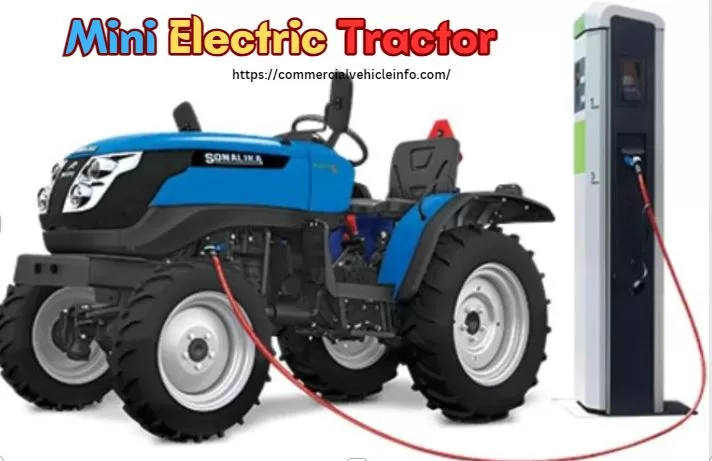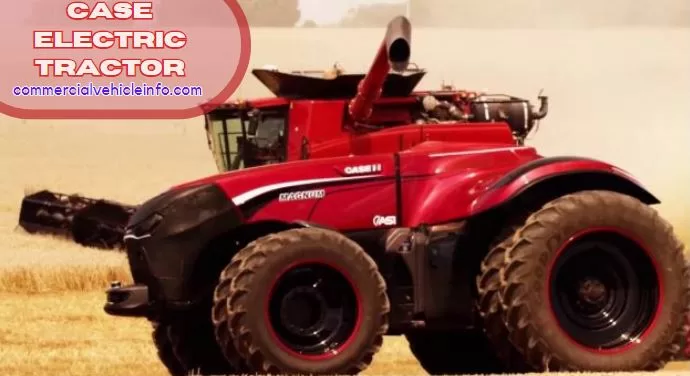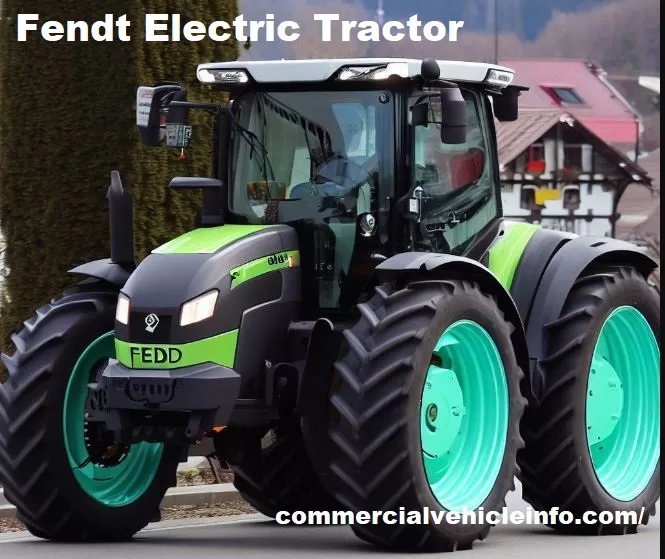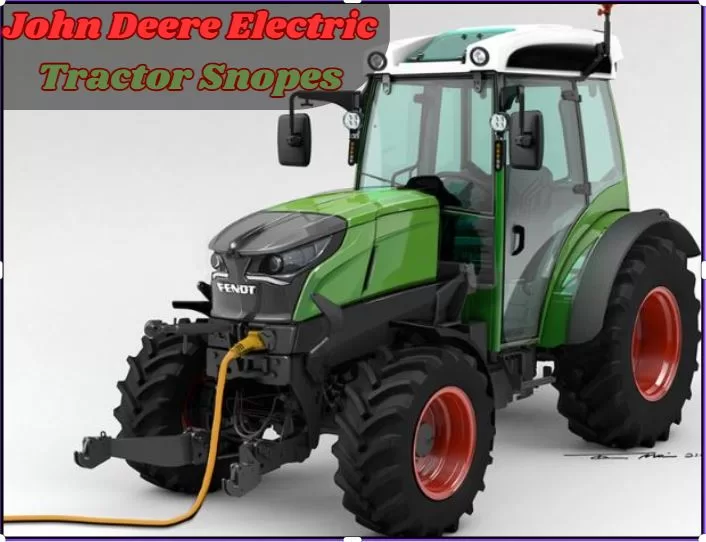Electric tractors have attracted a lot of interest in recent times because of their environmental benefits and the potential for savings in costs.
As the world shifts towards sustainable farming, farmers are more keen to switch from diesel-powered tractors that they have been using for decades to electric tractors. But, one of the most important factors to consider prior to switching is the cost.
In this article, we’ll look at the cost of electric tractors, which include their initial costs, the long-term savings, as well as the incentives offered by the government that are available.

What are some electric tractor manufacturers?
A variety of companies make electric tractors. These include:
- Fendt (Germany)
- Solectrac (USA)
- Monarch Tractor (USA)
- John Deere (USA)
- Case New Holland (USA)
- Escorts Ltd (India)
- Mahindra and Mahindra (India)
Monarch Tractor is the maker of the first electric, driver-less tractor, as well as Solectrac, offers Small electric tractors with compact sizes to smaller farms. Alongside these firms, there are also other makers of electric tractors on the market.
What are the Benefits of Using Electric Tractors?
- Reduction in emissions: Electric tractor engines do not release carbon emissions, which makes them greener and reduces air pollution.
- Lower operating expenses: Electric tractors have lower operating costs when compared to conventional tractors. The maintenance requirements are lower, which results in lower maintenance costs. In addition, the cost of electricity is typically less than gasoline or diesel, which leads to a reduction in energy costs.
- Noise pollution is reduced: Electric tractors run quietly, which reduces noise on farms. This is advantageous for farmers who work in areas with a lot of residential activity or who want a peaceful workspace.
- Performance and efficiency improved: Electric tractors provide higher efficiency and performance as compared to traditional tractors. They are equipped with fewer moving parts which means they require less maintenance requirements and expenses. Electric tractors are also equipped with autonomic technology, which allows them to run more efficiently and with greater precision operation.
- Better sustainability: Electric power in agricultural machinery is in line with the global trend towards sustainability, and reduces carbon dioxide emissions. Electric tractor help to reduce the dependence on fossil fuels and help create a cleaner as well as a more environmentally sustainable agriculture sector.
- Cost-effectiveness: Electric tractors could result in cost savings over the long term because of lower operating expenses and lower maintenance costs. They are also powered by renewable sources of energy like wind and solar which can further reduce expenses and dependence on fossil fuels.
- Enhances user experience: Electric tractors provide users with a more pleasant experience, with less noise and higher efficiency of the drivetrain.
What are the Best electric tractor models available in the market?
There are many electric tractor models that are available for sale, each having distinct characteristics and specifications. Some of the top electric tractor models include:
- Monarch Tractor MK-V Electric Tractor: The first completely electric, driver-free smart tractor that is data-driven, with an onboard screen with a smart interface 24/7 scouting 360-degree camera views and much more.
- Solectrac E25 Compact Electric Tractor: A versatile, 4WD utility vehicle that is ideal for hobby farms and sports fields, golf courses Equestrian centers, as well as municipalities.
- Solectrac Electric Tractor: A powerful and narrow electric tractor that is ideal for commercial and vineyard farms as well as.
- Kubota The LX20 series of compact tractors: A series of compact tractors that are flexible and simple to operate with a variety of attachments that are available.
- Mahindra EMax: A compact tractor that delivers high performance and efficiency, as well as many options and attachments.
How Much Does An Electric Tractor Cost?
| Electric Tractor | Price |
 Monarch MK-V Electric Tractor Monarch MK-V Electric Tractor |
$88,998.00 |
 Solectrac E25 Compact Electric Tractor Solectrac E25 Compact Electric Tractor |
$43,375.00 |
 Solectrac E70N Electric Tractor Solectrac E70N Electric Tractor |
$74,999.00 |
 Kubota LX20 Series Compact Tractor Kubota LX20 Series Compact Tractor |
$19,137.00 |
 Mahindra eMax Tractor Mahindra eMax Tractor |
$12,957.00 |
 Sonalika Tiger Electric Tractor Sonalika Tiger Electric Tractor |
$60,000 |
 HAV 45 S1 Tractor HAV 45 S1 Tractor |
$80,000 |
 HAV 50 S1 Tractor HAV 50 S1 Tractor |
$90,000 |
 John Deere Autonomous Electric Tractor John Deere Autonomous Electric Tractor |
$272,000 to $427,000 |
 John Deere Compact Electric Tractor John Deere Compact Electric Tractor |
$28,730.00 |
 New Holland T4.70E Electric Tractor New Holland T4.70E Electric Tractor |
$37,500 to $56,500 |
 Farmtrac Electric Tractor Farmtrac Electric Tractor |
$25969.00 |
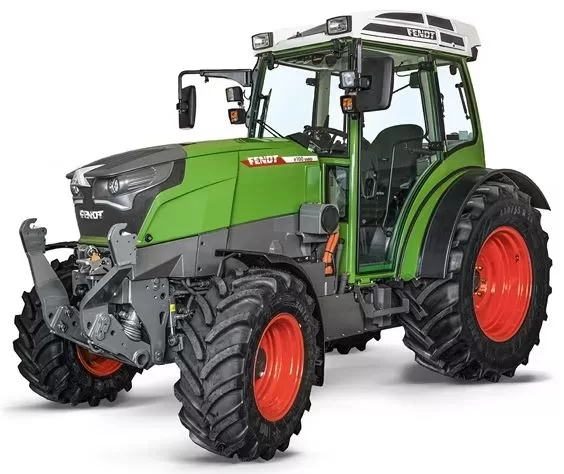 Fendt Electric Tractor Fendt Electric Tractor |
$45000.00 |
What are the factors that affect the cost of electric tractors?
- Battery Technology: Electric tractors heavily rely on battery technology, an area that remains relatively costly. The expense of batteries can constitute a substantial proportion of the overall cost of an electric tractor, accounting for roughly 25-40% of the total expenses.
Despite recent decreases in battery costs, they still contribute significantly to the elevated initial expense of electric tractors. - Power Electronics: The implementation of power electronics in electric tractors can also contribute to their elevated cost. These components play a pivotal role in converting the battery’s direct current (DC) output into alternating current (AC) power, which is essential for propelling the tractor’s electric motor.
- Limited Production Volume: Electric tractors are still a relatively fresh innovation, leading to constrained production volumes when compared to traditional tractors. This limitation can lead to escalated costs due to the absence of economies of scale.
- Charging Infrastructure: Electric tractors depend on charging infrastructure to replenish their battery charge. The expenses associated with establishing and upkeeping this charging network further contribute to the overall financial outlay of electric tractors.
- Research and Development Expenses: The development of novel electric tractor technology necessitates substantial investments in research and development. These expenditures are subsequently passed on to consumers, augmenting the initial financial outlay of electric tractors.
- Battery Degradation from Cycling: The battery within an electric tractor can deteriorate over time due to regular charge and discharge cycles, which can decrease its overall lifespan. This degradation introduces additional costs associated with eventual battery replacement.
- Cost of Inadequate Machinery Capacity: Electric tractors might require augmented battery capacity to perform specific tasks, leading to an increase in their overall cost. This need arises when the energy demands of a particular task surpass the capabilities of the tractor’s existing battery, mandating the integration of supplementary battery units.
What are the factors to consider when choosing the right electric tractor?
- Performance and power: The performance and power that an electric tractor can provide need to correspond to the particular farming requirements that include how big the farm and the kind of crops produced, and the work that is required.
- Technology and capacity of the battery: The capacity and type of battery that powers the electric tractor have a significant impact on its price and performance. The most advanced battery technologies, like lithium-ion batteries, are typically more expensive, but they offer better efficiency and last longer.
- Infrastructure for charging: Electric tractors rely on charging infrastructures to charge their batteries. Farmers should evaluate the accessibility of charging stations within their region and think about the limitations on the range of electric tractors.
- Cost: The price of the electric tractor can differ in accordance with a number of factors including model, brand, and specifications. Farmers must compare the price of electric tractors against their long-term savings with regard to fuel costs and maintenance costs.
- Govt incentives and assistance: The government and other organizations provide various incentives and support to encourage the use of electric tractors and encourage sustainable agricultural practices. Farmers must research available incentives within their region to make an informed choice.
- Technology that is autonomous: Electric tractors can be fitted with autonomous technology that allows the farmers to run them using fewer workers or no employees altogether. Farmers should think about the benefits that autonomous technology can bring, like greater efficiency and increased productivity, and consider the benefits against the expense of their implementation.
- Maintenance and maintenance: Electric tractors are equipped with fewer moving parts and require lesser maintenance than conventional tractors. However, it is important to take into consideration the maintenance and upkeep demands of an electric tractor, which includes battery replacement and maintenance of the charging infrastructure.
Cost Analysis: Initial Investment vs. Long-Term Savings
Aspects to be considered when analyzing the initial cost in comparison to the long-term savings from an electric tractor include:
Initial Investment:
- Price of tractor: Electric tractors typically come with a higher initial cost than traditional diesel tractors.
- Technology and capacity of batteries: Advanced battery technologies, like lithium-ion batteries, are generally more expensive but they provide better efficiency and longer battery life.
- Infrastructure for charging: Electric tractor models rely upon charging infrastructures to charge their batteries. Farmers must evaluate the availability of charging stations within their local area, and also consider the limitations on the range of electric tractors.
- Technology that is autonomous: Electric tractor can be equipped with an autonomous system that allows users to work using fewer workers, or none altogether.
- Government incentives as well as assistance: Governments and organizations provide a variety of incentives and financial support to encourage the use of electric tractors as well as promote sustainable agriculture practices.
Long-Term Savings:
- Price of tractor: Electric tractors have fewer operating expenses due to the cost of electricity being lower when compared the diesel fuel. Furthermore, electric tractors require less maintenance since they have less moving parts and don’t need oil changes.
- Technology and capacity of batteries: Electric tractors with advanced battery technology could result in substantial savings over the long run because of their extended battery life as well as lower maintenance demands.
- Infrastructure for charging: While it is true that the first investment into the charging infrastructure might be costly, it could be a significant saving over time in the cost of fuel. Furthermore, government and other organizations provide various incentives and subsidies to promote the use of electric tractors and encourage sustainable agriculture practices.
- Technology that is autonomous: The use of autonomous technology could improve the efficiency of a business, which results in long-term savings. However, the initial investment into autonomous technology is often high.
- Government incentives as well as assistance: Financial incentives can aid in the expense of buying an electric tractor, which results in long-term savings.
Electric Tractor Case Studies: Real-World Examples
Electric tractors are getting more widely used in agriculture due to their environmental benefits as well as potential cost savings. Here are a few instances of electric tractors in use in the field of agriculture:
- A Case Study on the Electrification of the Tractor: This study focuses on the possibility of electrification for specially designed agricultural tractors used in orchards and vineyards. The study examines the requirements for electric motors’ performance and the design of these tractor models.
- Cost Analysis of Electric Autonomous Battery field tractors in Agriculture: The study examines the total ownership cost of electric tractors including the degradation of batteries due to cycling as well as the expense of insufficient machine capacity. The study concluded that electric tractors could offer health, economic, and climate advantages.
- MK-V Electronic Tractor: Monarch Tractor is the manufacturer of the first electric, driver-free smart tractor that is data-driven and has an onboard screen with a smart interface that provides 24-7 scouting 360-degree camera views and much more. The MKV electric tractor has various different power options and features that can be adapted to meet different needs in farming.
- What do you think About Autonomous?: This video focuses on the availability of electric tractors and the potential advantages of using autonomous technology in farming. The video follows an agriculturalist who has embraced electric tractors, and talks about his experiences with them.
These case studies provide important insight into the usage of electronic tractors for agriculture, and the potential benefits and drawbacks.
They provide the stories of farmers that have made the switch to electric tractors and the impact they have had on the farming process.
What are the drawbacks of electric tractors?
Electric tractors are a great option for many reasons but also have a few drawbacks. They include:
- A higher upfront cost: Electric tractors can be more affordable than conventional models over the long term because of lower maintenance and fuel costs, the initial cost may be significantly more expensive. The price of batteries with advanced technologies and power electronics adds to the higher initial cost of an electric tractor.
- Battery range limited: Electric tractors are restricted by the range of the batteries. Based on the model as well as the capacity of the battery electric tractors could have a restricted operating range before they require recharging. This is a concern for farmers in huge areas or who require continuous operation with no frequent charging options.
- Infrastructure for charging: The availability of charging infrastructure may be a drawback for electric tractors. Contrary to conventional tractors, which can be charged rapidly electric tractors need the availability of charging facilities or local charging infrastructure. An absence of widespread charging infrastructure in rural areas could pose difficulties for farmers looking at electric tractors.
- Capacity and power reduced: Electric tractors could be less powerful and have less towing capacity when compared with their diesel counterparts. This could limit their use for large-scale farming operations that require a lot of power and torque.
- Replacement and degradation of batteries: As time passes the capacity and performance of the batteries for electric tractors may decrease. The degradation of batteries can lead to a lower operating range and reduced overall performance. At some point, the battery will have to be replaced which is a major expense on the part of farmers.
The Future of Electric Tractors in Agriculture
The prospective landscape for electric tractors within the agricultural domain is laden with promise, underscored by a host of advantageous facets and imminent progress. Here’s a synthesis of key findings:
- Electric tractors bear the transformative potential to reshape the agricultural realm by curtailing fuel expenditures, amplifying labor efficiency, and mitigating environmental impact.
- The integration of electric power into farming machinery harmonizes seamlessly with the worldwide movement toward sustainability and the imperative to diminish greenhouse gas emissions.
- Electric tractors present a multitude of advantages over their traditional counterparts, encompassing diminished emissions, decreased operational outlays, minimized noise pollution, and augmented efficiency and output, alongside governmental incentives and support.
- While the evolution of electric tractors trails that of the electric vehicle sector, persistent technological innovations and economies of scale are progressively rendering them more accessible and pragmatic for farmers.
- Electric tractors emit notably lower noise levels compared to their conventional counterparts, ensuring minimal disruption to local wildlife and neighboring communities.
- The future of agriculture shines brilliantly with the advent of electric tractors, holding the potential to emerge as the vanguard of farming practices, contingent upon judicious government endorsement and continued technological advancements.
Conclusion
The decision to invest in an electric tractor involves a thorough understanding of its costs and benefits.
While the initial purchase price might be higher compared to conventional tractors, the long-term cost savings, lower environmental impact, and potential government incentives make electric tractors a viable option.
Farmers should carefully assess their operational needs, research available models, and consider the evolving landscape of electric tractor technology to make an informed choice.
For more details visit the commercialvehicleinfo.com.
FAQs
Electric tractors can be suitable for a wide range of farming applications, including plowing, tilling, and harvesting. However, farmers should evaluate their specific needs and requirements before making a purchase.
The charging time for an electric tractor can vary depending on the battery capacity and charging infrastructure. On average, it can take anywhere from 4 to 8 hours to fully charge an electric tractor.
Yes, electric tractors can handle heavy-duty tasks, provided they have the appropriate power and performance specifications. Some electric tractors have higher horsepower and torque ratings than traditional diesel tractors.
The lifespan of an electric tractor’s battery can vary depending on several factors, including usage patterns, charging habits, and environmental conditions. On average, electric tractor batteries can last up to 10 years with proper maintenance.
Electric tractors require less maintenance than traditional diesel tractors, as they have fewer moving parts and do not require oil changes. However, regular battery maintenance and charging are essential to ensure optimal performance.
Electric tractors tend to have a higher upfront cost than traditional diesel tractors. However, they can provide significant savings in the long run due to lower operating costs and reduced maintenance expenses.
The cost of an electric tractor can be influenced by several factors, including battery technology and capacity, power and performance specifications, and additional features and accessories.
Governments worldwide offer various incentives and subsidies for transitioning to electric vehicles, including electric tractors. These incentives can help offset the initial cost of purchasing an electric tractor.
Yes, electric tractors can be charged using renewable energy sources such as solar or wind power. This can further reduce the cost of operation and minimize the environmental impact.
Electric tractors offer several advantages over traditional diesel tractors, including environmental benefits, cost savings in the long run, and reduced noise pollution.
Electric tractors have some drawbacks, including limited battery technology, slow speeds, and inadequate energy storage. However, these limitations are expected to improve with technological advancements.
The market for electric tractors is still relatively small compared to traditional diesel tractors. However, it is expected to grow significantly in the coming years due to increasing demand for sustainable agriculture practices.
Farmers should consider several factors before purchasing an electric tractor, including their specific farming needs and requirements, charging infrastructure and range limitations, and available government incentives.

